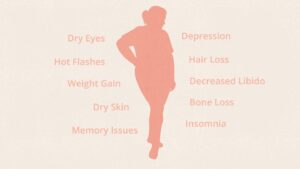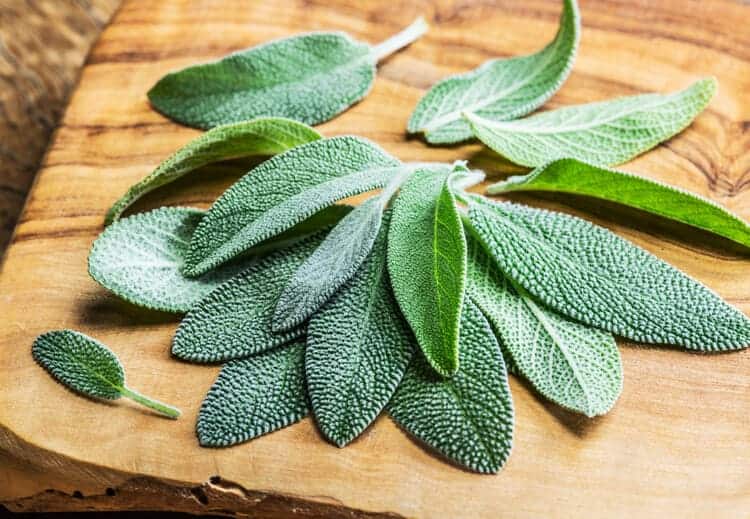Menopause is a natural biological process that marks the end of a woman’s reproductive years. While it is a normal phase of life, the symptoms associated with menopause, such as hot flashes, can be challenging for many women. Hot flashes, characterized by sudden feelings of warmth, flushing, and sweating, are one of the most common and bothersome symptoms. While hormone replacement therapy (HRT) is a conventional treatment option, many women are seeking natural alternatives. In this blog, we will explore various herbs for menopause hot flashes and how these benefit.
Contents
- 1 Are Hot Flashes a Sign of Menopause?
- 2 Top 17 Herbs for Menopause Hot Flashes
- 2.1 Black Cohosh (Cimicifuga Racemosa)
- 2.2 Sage (Salvia Officinalis)
- 2.3 Dong Quai (Angelica Sinensis)
- 2.4 Red Clover (Trifolium Pratense)
- 2.5 Evening Primrose Oil (Oenothera Biennis)
- 2.6 Chaste Tree Berry (Vitex Agnus-castus)
- 2.7 Ginseng (Panax Ginseng)
- 2.8 Motherwort (Leonurus Cardiaca)
- 2.9 Licorice Root (Glycyrrhiza Glabra)
- 2.10 Maca Root (Lepidium Meyenii)
- 2.11 Ashwagandha (Withania Somnifera)
- 2.12 Ginkgo Biloba (Ginkgo Biloba)
- 2.13 Nettle (Urtica Dioica)
- 2.14 Rhodiola (Rhodiola Rosea)
- 2.15 Wild Yam (Dioscorea Villosa)
- 2.16 Ginger (Zingiber Officinale)
- 2.17 Borage (Borago Officinalis)
- 3 Benefits of Herbs for Menopause Hot Flashes
- 4 Conclusion
Are Hot Flashes a Sign of Menopause?

Yes, hot flashes are commonly considered a classic symptom and a hallmark sign of menopause. Menopause is a natural biological process that marks the end of a woman’s reproductive years. It typically occurs in the late 40s or early 50s, but the age at which women experience menopause can vary.
Hot flashes, also known as vasomotor symptoms, are characterized by sudden and intense feelings of heat, flushing, and sweating. They can occur during the day or night and may last for a few seconds to several minutes. Hot flashes are caused by hormonal changes, particularly a decline in estrogen levels, which is a key aspect of the menopausal transition.
The hormonal fluctuations associated with menopause can disrupt the body’s temperature regulation, leading to the sensation of heat. Hot flashes are often accompanied by other symptoms such as night sweats, sleep disturbances, mood swings, and changes in vaginal and urinary health.
Top 17 Herbs for Menopause Hot Flashes
Managing menopause symptoms, especially hot flashes, with the help of herbs is a natural approach that many women find beneficial. Here are ten herbs that have been recognized for their potential to alleviate menopausal hot flashes:
Black Cohosh (Cimicifuga Racemosa)
- Benefits: Widely used for menopausal symptoms, black cohosh may help reduce the frequency and intensity of hot flashes.
- Usage: Available in various forms, including capsules and tinctures. It’s important to follow recommended dosages.
Sage (Salvia Officinalis)
- Benefits: Sage has been traditionally used to manage hot flashes and night sweats associated with menopause.
- Usage: Enjoyed as a tea or taken in supplement form, sage can be a flavorful addition to a menopausal wellness routine.
Dong Quai (Angelica Sinensis)
- Benefits: Often referred to as “female ginseng,” dong quai may help balance hormonal fluctuations, including those contributing to hot flashes.
- Usage: Available in capsules or tinctures, it should be used under the guidance of a healthcare professional.
Red Clover (Trifolium Pratense)
- Benefits: Rich in isoflavones, red clover may provide relief from hot flashes by mimicking the effects of estrogen.
- Usage: Consumed as a tea or in supplement form, red clover is considered a gentle option for managing menopausal symptoms.
Evening Primrose Oil (Oenothera Biennis)
- Benefits: The gamma-linolenic acid (GLA) in evening prim menopause, potentially reduces the frequency and severity of hot flashes.
- Usage: Available in oil or capsule form, it is advisable to follow recommended dosages and consult with a healthcare professional.
Chaste Tree Berry (Vitex Agnus-castus)
- Benefits: Known for its potential to influence hormonal balance, chaste tree berry may help alleviate menopausal symptoms, including hot flashes.
- Usage: Often found in capsule or tincture form, it should be used cautiously and under professional guidance.
Ginseng (Panax Ginseng)
- Benefits: Ginseng, particularly Panax ginseng, may offer support during menopause by helping to regulate hormonal changes and reduce hot flashes.
- Usage: Available in various forms, including capsules and teas. It’s essential to choose the right type and follow recommended dosages.
Motherwort (Leonurus Cardiaca)
- Benefits: Motherwort is known for its calming effects and may help alleviate hot flashes and anxiety associated with menopause.
- Usage: Often consumed as a tea or in tincture form, it can be a valuable addition to a holistic menopause management plan.
Licorice Root (Glycyrrhiza Glabra)
- Benefits: Licorice root may help balance hormonal levels and provide relief from hot flashes during menopause.
- Usage: Available in teas, capsules, or tinctures, it should be used cautiously due to its potential effects on blood pressure.
Maca Root (Lepidium Meyenii)
- Benefits: Maca root, known as an adaptogen, may help support hormonal balance and reduce the frequency of hot flashes.
- Usage: Available in powder or capsule form, maca root can be incorporated into smoothies or taken as a supplement.
Ashwagandha (Withania Somnifera)
- Benefits: Ashwagandha, an adaptogenic herb, may help the body adapt to stress and balance hormones, potentially reducing the frequency and severity of hot flashes.
- Usage: Available in powder or capsule form, ashwagandha is often used to support overall well-being during menopause.
Ginkgo Biloba (Ginkgo Biloba)
- Benefits: Ginkgo biloba is known for its potential to improve blood circulation and may contribute to reducing hot flashes.
- Usage: Typically taken in supplement form, ginkgo biloba should be used cautiously, especially if there are concerns about interactions with medications.
Nettle (Urtica Dioica)
- Benefits: Nettle is rich in nutrients and may help alleviate symptoms like hot flashes by supporting overall health during menopause.
- Usage: Nettle tea is a popular and easy way to incorporate this herb into your routine. It can also be taken as a supplement.
Rhodiola (Rhodiola Rosea)
- Benefits: Rhodiola, another adaptogen, may help the body cope with stress and reduce the intensity of hot flashes.
- Usage: Often available in capsule form, rhodiola is commonly used to support energy and resilience during times of hormonal changes.
Wild Yam (Dioscorea Villosa)
- Benefits: Wild yam is believed to contain compounds that can be converted into progesterone, potentially helping balance hormonal fluctuations.
- Usage: Available in cream, capsule, or tincture form, wild yam should be used cautiously and under the guidance of a healthcare professional.
Ginger (Zingiber Officinale)
- Benefits: Ginger has anti-inflammatory properties and may help alleviate symptoms like hot flashes.
- Usage: Incorporating fresh ginger into your diet, either in cooking or as a tea, can be a flavorful way to enjoy its potential benefits.
Borage (Borago Officinalis)
- Benefits: Borage oil, rich in gamma-linolenic acid (GLA), may help regulate hormonal imbalances and reduce the severity of hot flashes.
- Usage: Borage oil is available in supplement form and should be used cautiously, especially if there are concerns about interactions with medications.
Benefits of Herbs for Menopause Hot Flashes

Herbs have been studied for their potential benefits in managing menopause symptoms, particularly hot flashes. While individual responses may vary, here are some general benefits associated with certain herbs for menopausal hot flashes:
- Hormonal Balance: Some herbs are believed to have phytoestrogenic properties, which means they contain compounds that can mimic the effects of estrogen in the body. This may help balance hormonal fluctuations that contribute to hot flashes.
- Vasomotor Symptom Relief: Certain herbs may have a calming effect on the central nervous system, potentially reducing the frequency and intensity of hot flashes by modulating the body’s response to temperature regulation.
- Anti-inflammatory Effects: Some herbs are known for their anti-inflammatory properties, which could be beneficial in alleviating symptoms related to inflammation, including hot flashes.
- Improvement in Sleep Quality: Menopausal symptoms, including hot flashes, can disrupt sleep. Certain herbs may have a calming or sedative effect, promoting better sleep and overall well-being.
- Bone Health Support: Menopause is associated with a decline in estrogen, which can impact bone density. Some herbs may provide support for bone health during this transitional period.
- Emotional Well-being: Menopause can be accompanied by mood swings and emotional challenges. Some herbs are believed to have mood-stabilizing properties, potentially offering emotional support during this time.
- Cardiovascular Health: Certain herbs may have cardiovascular benefits, which can be particularly important for women going through menopause, as they are at an increased risk of cardiovascular issues.
Conclusion
While herbs can offer natural relief for menopausal hot flashes, it is crucial to approach their use with caution. Consultation with a healthcare professional is essential before incorporating herbal remedies into your routine, especially if you have pre-existing health conditions or are taking medications.
Additionally, lifestyle modifications, such as maintaining a healthy diet, regular exercise, and stress management, can complement herbal remedies in managing menopausal symptoms. Embracing a holistic approach can empower women to navigate the challenges of menopause with grace and comfort.
If you are facing menopause-related issues, menopause treatment at HerMantra can help. Book your free trial online menopause treatment session now.


